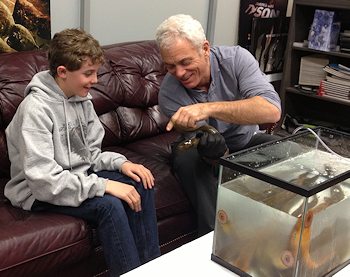JEREMY WADE: MONSTER HUNTER
By Tyler Cotterell
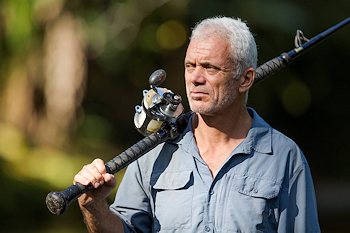 When he was young, all Jeremy Wade wanted to do was write stories. Now look where he is. He is the author of “River Monsters” which tells stories of his fishing adventures around the world. He is also the co-author of an earlier book called “Somewhere Down the Crazy River.”
When he was young, all Jeremy Wade wanted to do was write stories. Now look where he is. He is the author of “River Monsters” which tells stories of his fishing adventures around the world. He is also the co-author of an earlier book called “Somewhere Down the Crazy River.”
Growing up he wasn’t all that into fishing. No one in his family even knew how to fish. It was actually one of Wade’s school friends that taught him more about how to fish and it got him more into fishing. His parents did however get him his first fishing rod and outfit. He also made a few of his own rods.
Wade grew up by the River Stour in Suffolk England. It was there where he caught his first fish, a roche. When he was 7 or 8 he had a feeling that fishing might always be in his life, but he never expected it to be more than a spare time activity.
He recalls, “I think once I started, and once I started catching fish, that awakened my curiosity and I wanted to see what other kinds of fish were down there, and I wanted to catch bigger fish, and I wanted to go to different places. So, I guess everything since then has been a continuation of that process.”
Fast forward to 2009. River Monsters was intended to only be one episode, but since Wade’s first catch on the show, it has been a hit. Why wouldn’t it be? We have all heard of monsters whether they live under our beds or in our closets, but these are real and are caught on camera.
Jeremy remembers, “…we wanted to make it more than just a fishing show. We wanted to interest people, not just people who go fishing, but everybody.”
So, what makes a show about fishing so interesting and mysterious?
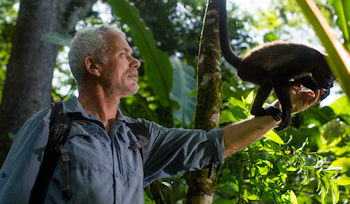 Jeremy Wade reveals, “…a lot of the animals that we show are not very pretty animals. They are quite ugly. But everybody likes dinosaurs and they are quite ugly. And the fact that it is River Monsters, not Sea Monsters. For a long time people have been making programs about what lives in the sea because the water is normally quite clear and you can just send somebody in with a camera and they can show you what is there. You can’t do that with a river because you can’t see what’s there. So, the only way in most places is to pull something out.
Jeremy Wade reveals, “…a lot of the animals that we show are not very pretty animals. They are quite ugly. But everybody likes dinosaurs and they are quite ugly. And the fact that it is River Monsters, not Sea Monsters. For a long time people have been making programs about what lives in the sea because the water is normally quite clear and you can just send somebody in with a camera and they can show you what is there. You can’t do that with a river because you can’t see what’s there. So, the only way in most places is to pull something out.
A lot of what we produce – things like the goonch catfish and the goliath tiger fish – most people have never seen those and had no idea before that they existed.“
Most of the fish that we film are predators; they are big; they’ve got teeth, maybe. Everybody has this fascination with predators. People watch programs about lions, tigers, and that is because our ancestors were people who paid attention to dangerous things that are out there in the environment. The people who didn’t pay attention didn’t get to leave descendents. It is sort of part of our software.”
To film an episode of River Monsters, Jeremy Wade needs a team of professionals from the program. This includes the cameraman, the director, sound recorders, an assistant producer to handle the local arrangements, and the technical assistant. But the most important part of the crew are the local experts.
As he explains, “ One of the very important things about “River Monsters” is that it is a collaboration with the local people. We try and find somebody locally who knows about the fish and then between myself and somebody local we can achieve something, maybe which I couldn’t do no my own, and maybe they couldn’t do on their own. But, you have to get their trust.”
Jeremy Wade’s journey has taken him to the most exciting, dangerous, and intriguing places in the world. However he treasures his visit to Mongolia and considers it to be the most beautiful place in the world.
“Mongolia is normally very cold. The time that we were there, we were fishing for something called a taimen. I think there’s only one or two months when everything is green, and it was amazing.
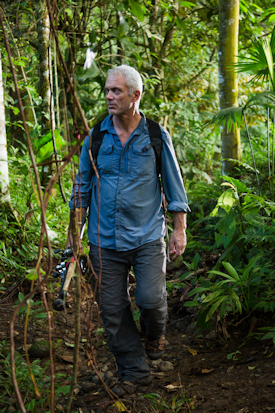 You’ve got this sparkling river; you’ve got these incredible mountains right next to the river, and also the very nice green. I was floating down in a raft and I am casting toward the likely looking places as we float down. And there were times when I actually wanted to stop fishing because I just wanted to watch the landscape. When people say
You’ve got this sparkling river; you’ve got these incredible mountains right next to the river, and also the very nice green. I was floating down in a raft and I am casting toward the likely looking places as we float down. And there were times when I actually wanted to stop fishing because I just wanted to watch the landscape. When people say
“breathtaking,” I realize what that actually means – it means you almost forget to breathe because you are just looking at this amazing landscape,” he revealed.
Some of the fish Wade has caught resemble the monsters in our imaginations. Long rows of jagged teeth and a stripe of spikes going down its back. The most fierce and intense catch of Wade’s career was the goliath tiger fish which he caught in the Congo. Not only was the fish scary but, it was very hard to get to making the trip very demanding.
Mr. Wade explained that, “They are very hard to catch and there’s not many people who have caught them. One of the main reasons not many have caught them is because they live in the part of the world that is very hard to get to.
Not only are the fish scary, but so is the adventure to catch the fish. Going up the Amazon River is no easy task, but try it without being able to call for help. With a couple of boats filled with supplies and just about five people. There is no paramedic and you
Can’t call 911, he explained.
Wade had to travel through the Amazon River. He learned that sometimes, “…you’ve got to deal with things yourself”.
In order to prepare for this, his crew had to take many classes consisting of first aid and CPR training. Occasionally, these classes came in handy. On a stormy day, Wade was filming on a piece of rock in the middle of a river in Suriname, in the northern part of South America, when there was a sudden flash of light and a crash of thunder.
“I didn’t even think about it, I just threw myself to the ground.” said Wade.
After a few moments everyone got up and ran to the boat. On the way there, they saw somebody lying at the bottom of the boat. It was the sound recorder. Unfortunately, he had been struck by lightening. Straightaway the team talked to him and found out he didn’t lose consciousness. They all made sure he stayed awake and didn’t drift. If it weren’t for their training, the outcome of the event would have been totally different.
Many times Jeremy wade has to gain the trust of locals in remote areas of the world.
“There was one place where the local people took a while to warm up, Papa New Guinea, where we went a few years ago. These were people who were headhunters one or two generations ago, so that was possibly a little bit tense,” he joked.
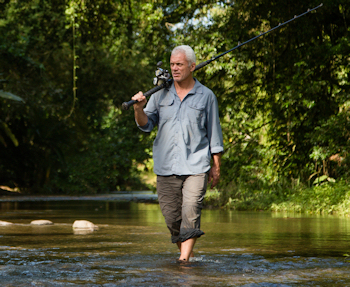 Wade has encountered a number of hazards on his journeys, including the risk of radiation poisoning in the Ukraine.
Wade has encountered a number of hazards on his journeys, including the risk of radiation poisoning in the Ukraine.
Wade reminds us that, “If you are going somewhere like that, the important thing is to really do your research, do your homework. Since the (Chernobyl) accident happened, they have done quite a good cleanup operation. And for most of the sites, the radiation levels are quite low. ” With a local guide and wearing a radiation meter, he was able to fish in places that most people would never experience.
Jeremy Wade also discussed the environmental hazard of overfishing .
“Overfishing is a big problem in the world, particularly in the Amazon. With more and more people appearing, the rivers can’t keep pace. There has been a noticeable decline just in the last 50 years, in the numbers of fish and the size of fish you find in these rivers. It is different than the sea in that normally a river has one or two countries involved so politicians can maybe help along things. Whereas the sea is a bit of a lawless zone and it is not such a hopeful situation,” he explained.
Wade was a teacher in the UK, but he considers what he does is still being a teacher of sorts as he is always passing on his knowledge from his studies and River Monsters.
“I just finished a lecture tour in the U.K. I spent two weeks just going around every night talking to different groups of people in theatres around the U.K.
It is something I would like to do more of, but again it is finding the time for it. It would be nice to bring something like that to the U.S. but I don’t know if we will have the time for it,” he revealed.
If you are not willing to risk your life for the sake of learning about these fascinating river monsters, than this may not be the career for you. It’s a good thing there are spectacular people like Jeremy Wade who are happy to share their experiences with you. To see some of the fiercest monsters unhooked, just turn on the TV and watch River Monsters on Animal Planet.

